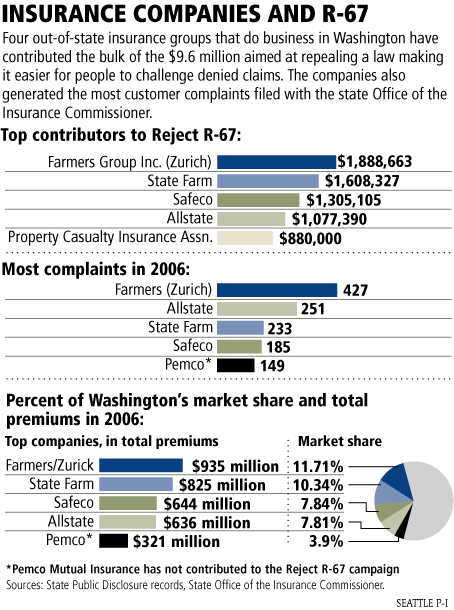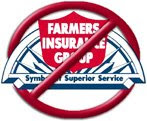Big insurers dig deep to fight R-67
Measure strengthens policyholders with unpaid claims
By CHRIS McGANN
P-I CAPITOL CORRESPONDENT
OLYMPIA -- Four large insurance groups that do business in Washington have contributed more than 60 percent of the $9.6 million aimed at repealing a new law making it easier for people to fight the denial of claims.
Those groups, which have the biggest slice of the state's insurance market, also generated the most customer complaints with the state Office of the Insurance Commissioner -- 1,096 last year.
Weinstein
Sen. Brian Weinstein, D-Mercer Island, the insurance legislation's prime sponsor, said the correlation between contributions and complaints isn't surprising.
"The (complaints) brought against them are just the tip of the iceberg," Weinstein said. "It seems to me $6 million is a fantastic investment if they can stop this from becoming law and continue to delay and deny claims."
The millions the insurance companies have invested in trying to defeat Referendum 67 in November is a pittance compared with what they have at stake if voters approve the measure and validate the new law, which would allow policyholders to sue for triple damages when a company denies a legitimate claim. A no vote on R-67 would repeal the new law; a yes vote would affirm it.
Farmers (Zurich), Allstate, State Farm and Safeco insurance groups took in more than $3 billion in premiums from Washington policyholders last year, and they hold the largest portions of the state auto and homeowners insurance market.
Weinstein said preventing legal action on just one major claim from occurring in the context of the new Fair Conduct Act could offset the company's investment in the campaign.
"The consequences are that consumers will continue to be ripped off by their insurance companies who can do so with impunity," he said.
Washington is one of five states that do not allow punitive damages.
Weinstein, a former trial lawyer, said the new law provides an incentive for companies to act in good faith with their customers.
"It's important to have some type of incentive to keep an insurance company or a corporation from acting badly, because if you don't have punitive damages and you just say they have to compensate a plaintiff for the exact loss, they could write that into their business plan as a cost of doing business," he said. "They have no incentive to do the right thing."
The four large groups and the other insurance companies that oppose the referendum and the new legislation that it would codify into law say the increased litigation and costs would simply be passed on to consumers.
The Reject R-67 campaign cites an industry study that says the costs associated with the Fair Conduct Act would be passed on in the form of $650 million in rate increases.
The Property Casualty Insurance Association, a national group that represents the industry, says insurers are already required by law to act in good faith in the interest of their policyholders, and severe penalties already exist for those who do not.
The groups said Washington's new legislation is part of a national push by trial lawyers to encourage more lawsuits "and raise insurance rates for consumers and business."
Seven other states -- Connecticut, Maine, Maryland, Minnesota, Montana, Oregon and Vermont -- have worked to expand the ability to sue insurance companies, according to the association.
"The trial bar is supporting bills across the country that would make it easier to bring suits, recover damages and collect more attorney's fees," the association Web site says.
Supporters of the Fair Conduct Act, mainly the Washington State Trial Lawyers Association, have contributed $1.8 million to the Approve 67 effort.
The Insurance Commissioner's Office evaluated all the companies doing business in Washington with an index based on the number of complaints filed against each company compared to its market share.
In the index, which rates companies with a complaint-to-market-share ratio above 1 as "higher than average," Farmers Insurance Co. of Washington and Safeco Insurance Co. of America were rated slightly higher than average on the complaint index for auto insurance. The other main companies of the groups ranked below the average.
Both sides in the R-67 battle have deep pockets -- but the industry appears to be reaching deeper. According to at least one top company, the profits have been robust.
State Farm's chief financial officer, Michael Tipsord, said in a interview for the company's magazine that performance has been stellar.
"At a very high level, 2006 was a positive year from a financial performance standpoint. We saw an increase of almost $8 billion in our combined net worth for all State Farm affiliate companies (Group Net Worth) -- moving the State Farm enterprise to $58.1 billion in overall net worth," Tipsord said.
On Friday, the Approve 67 campaign criticized the industry's money-saving methods.
On the campaign's behalf, Robert Dietz of Arlington, a Farmers Insurance employee for 14 years, said insurance companies implemented computer programs designed to consistently lowball claims to increase company profits. Employees' performance was measured based on their use of this software and incentive programs, such as Farmers' "Quest for Gold," which financially rewarded claims adjustors for generating profits, according to insurance company memos.

FUNDING A BALLOT FIGHT
OPPONENTS: $9.6 MILLION
More than 60 percent of the money is from four large out-of-state insurance groups.
SUPPORTERS: $1.8 MILLION
Amount given by backers of the Fair Conduct Act -- mainly the Washington State Trial Lawyers Association -- to the Approve 67 campaign.
P-I reporter Chris McGann can be reached at 360-943-3990 or chrismcgann@seattlepi.com.
Copied without permission for Fair Use from
http://seattlepi.nwsource.com/local/335354_insurance13.html



0 Comments:
Post a Comment
<< Home